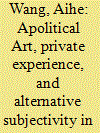|
|
|
Sort Order |
|
|
|
Items / Page
|
|
|
|
|
|
|
| Srl | Item |
| 1 |
ID:
136291


|
|
|
|
|
| Summary/Abstract |
For a revolution over “culture,” remarkably little has been said about the Cultural Revolution culture itself, and even less about the apolitical, private art produced underground. This article explores this apolitical, private art, arguing that it was a “rebellion of the heart” against the state’s ruthless destruction of the private sphere. Mao’s Party-state drastically fragmented families, moulding socialist subjects through “revolution deep down into the soul.” Paintings of (broken) homes and interiors, flowers, and moonlight articulate lived experiences of the revolution while silently reinventing a private refuge for the body and soul to subsist beyond state control. Defying orthodox revolutionary mass culture, this apolitical art articulated private experience and created a private inner world for a new form of modern subjectivity, while generating community and human solidarity against relentless class struggle and alienation.
|
|
|
|
|
|
|
|
|
|
|
|
|
|
|
|
| 2 |
ID:
144366


|
|
|
|
|
| Summary/Abstract |
By late 1967, there had been clear signs that China’s Cultural Revolution had entered the phase of retrenchment and moderation. Despite continuing radical extravagance, Beijing’s efforts revolved around taming the divided mass movement and establishing new organs of local power. In this nationwide milieu, the province of Hunan stood out as a remarkable exception. It was in Hunan that there emerged a diffused yet vigorous movement in opposition to Beijing’s attempts to rebuild the Party and state authorities. This movement, the Shengwulian, has been discussed by a number of China scholars. Conventional scholarly wisdom regarding this critical episode, however, seems to be based on several less-than-accurate premises. Using newly available sources, this paper re-examines the Shengwulian episode, with a special focus on how nationally significant issues, radiating out from the political center, played themselves out in relation to local contingencies, cleavages and complex power relationships.
|
|
|
|
|
|
|
|
|
|
|
|
|
|
|
|
|
|
|
|
|